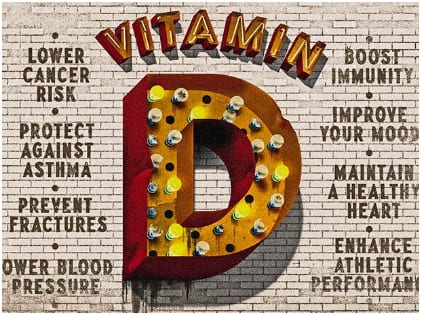 Vitamin D is an important nutrient with a range of benefits and a big role to play in our overall health. The importance of this vital nutrient is often underplayed and other better-known vitamins and nutrients like Vitamin C, calcium, and iron all steal the show when it comes to healthcare. Here you can learn all you need to know about vitamin D and why you need to pay attention to your body’s vitamin D levels.
Vitamin D is an important nutrient with a range of benefits and a big role to play in our overall health. The importance of this vital nutrient is often underplayed and other better-known vitamins and nutrients like Vitamin C, calcium, and iron all steal the show when it comes to healthcare. Here you can learn all you need to know about vitamin D and why you need to pay attention to your body’s vitamin D levels.
What It Is
Vitamin D is called a vitamin, but it’s actually is a hormone. The reason why vitamin D isn’t really a vitamin is that technically, vitamins cannot be produced by the body and are obtained from our diet or supplements. On the other hand, the sunshine vitamin, as it is endearingly termed, is produced by the body when your skin is exposed to sunlight. However, you can also obtain vitamin D through your diet or even supplements from your pharmacy.
Sources of Vitamin D
 Of course, soaking up some sun is a fantastic way of getting vitamin D, but sometimes, there are other factors to consider when you’re in the sun, like premature aging and skin cancer. But 5-10 minutes of sunshine about 3 times a week is a good way to have your body producing vitamin D of its own. In your diet, good sources of vitamin D are found in fatty fish like salmon, tuna and mackerel, cheese, egg yolks, and beef liver. Some food items are fortified with vitamin D, like bread, milk, and cereals. Keep an eye out for the labels of the foods you purchase and be sure to look up the levels of Vitamin D in the product on the nutritional information label.
Of course, soaking up some sun is a fantastic way of getting vitamin D, but sometimes, there are other factors to consider when you’re in the sun, like premature aging and skin cancer. But 5-10 minutes of sunshine about 3 times a week is a good way to have your body producing vitamin D of its own. In your diet, good sources of vitamin D are found in fatty fish like salmon, tuna and mackerel, cheese, egg yolks, and beef liver. Some food items are fortified with vitamin D, like bread, milk, and cereals. Keep an eye out for the labels of the foods you purchase and be sure to look up the levels of Vitamin D in the product on the nutritional information label.
The Roles of Vitamin D
 Vitamin D helps keep the body up and running. The right amount of vitamin D in your system will help you maintain strong and healthy bones and teeth and can even protect you from type I diabetes, cancer, or multiple sclerosis. Vitamin D supports the immune system, nervous system, and the brain. You can also count on better cardiovascular health and even better lung function if you have your vitamin D levels on track!
Vitamin D helps keep the body up and running. The right amount of vitamin D in your system will help you maintain strong and healthy bones and teeth and can even protect you from type I diabetes, cancer, or multiple sclerosis. Vitamin D supports the immune system, nervous system, and the brain. You can also count on better cardiovascular health and even better lung function if you have your vitamin D levels on track!
The Recommended Intake
Your intake of vitamin D is measured in one of two ways – either in mcg (micrograms) or in IU (International Units). As a conversion factor, 1 mcg equals 40IU of vitamin D. Vitamin D intake is measured as a recommended intake as follows:
Infants (0-12 months) – 10mcg or 400IU
Children (1-18 yrs) – 15mcg or 600IU
Adults (18-70 yrs) – 15mcg or 600IU
Seniors (70 and above) – 20mcg or 800IU
Pregnant/lactating women – 15mcg or 600 IU
Common Reasons For Deficiency
The darker the pigment in your skin, the more difficult it will be for your skin to absorb the UVB rays in the sunlight that are necessary to kickstart the process of vitamin D production in your system. Likewise, the use of sunscreen reduces the abilities of your body to produce the vitamin by a whopping 95% at maximum. The higher the SPF in the sunscreen applied, the higher the reduction in your body’s ability to produce the vitamin. Wearing thick clothing outside also inhibits vitamin D production. Lifestyle factors like working indoors or working night shift and sleeping during the day can also contribute to fewer hours of exposure to sunlight.
Symptoms & Risks of Deficiency
 If you have a vitamin D deficiency, the symptoms to keep an eye out for are fatigue, hair loss, painful bones, or back muscle pain, depression, and persistent colds and flu. If vitamin D deficiency is left unresolved for long periods of time, it can result in conditions like depression, diabetes, hypertension, obesity, osteoporosis, fibromyalgia, and even neurodegenerative diseases like Alzheimer’s. Deficiency may even contribute to the development of cancer of the prostate, breast or colon.
If you have a vitamin D deficiency, the symptoms to keep an eye out for are fatigue, hair loss, painful bones, or back muscle pain, depression, and persistent colds and flu. If vitamin D deficiency is left unresolved for long periods of time, it can result in conditions like depression, diabetes, hypertension, obesity, osteoporosis, fibromyalgia, and even neurodegenerative diseases like Alzheimer’s. Deficiency may even contribute to the development of cancer of the prostate, breast or colon.
High Levels of Vitamin D
On the flip side, having too much vitamin D in your system is also undesirable as it can lead to over calcification of bones, hardening of blood vessels, and damage to the lungs, kidneys, or heart. Common symptoms of what is termed hypervitaminosis D are nausea and headache, dry mouth, loss of appetite, constipation or diarrhea, or a metallic taste in the mouth. It can be easy to reach undesirable levels of vitamin D if you obtain your vitamin D from supplements, so try to obtain your vitamin D from natural sources.
Bask in the sunlight early in the morning or take supplements to get your healthy dose of vitamin D. But before you start taking vitamin D supplements, consult your physician first!
